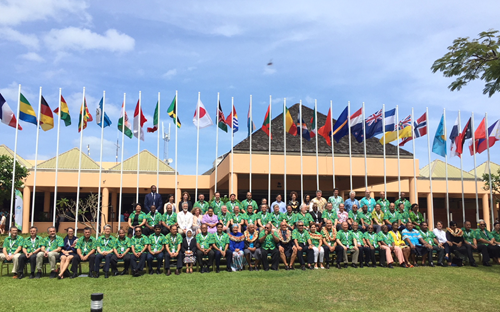A ministerial meeting in Fiji on Tuesday, October 17, 2017 has stressed the urgent need for progress to meet the pressing schedules of the Paris Climate Change Agreement and build a global “Grand Coalition” of action between all levels of government, business and civil society.

“Nations cannot protect themselves individually without all the parties to the Paris Agreement doing what they have already agreed to do and more,” COP23 President and Prime Minister of Fiji, Frank Bainimarama, told delegates from 68 countries at the two-day “pre-COP” in Nadi.
Governments gather on November 6 in Bonn, Germany for the two-week annual UN climate change conference (COP23), along with tens of thousands of people from cities, states, companies and civil society organisations who are already acting to reduce greenhouse gas emissions and protect their societies against climate change to ensure a sustainable future.
The Paris Agreement is a long-term global strategy to keep the average global temperature rise since the late 19th century well below 2C degrees and as close to 1.5C as possible. But with about one degree of that rise already in the system and extreme climate events rising by the year, a faster, bigger and united response is required.
Mr Bainimarama said: “We can no longer ignore this crisis. Whether it is fires in California, Portugal and Spain. Flooding in Nigeria, India and Bangladesh. The dramatic Arctic melt. Ice breaking off the continent of Antarctica. The recent hurricanes that devastated the Caribbean and the southern United States. Or the hurricane that has just struck Ireland and Scotland – the tenth hurricane of the Atlantic season this year. It’s hard to find any part of the world that is unaffected by these events.”
Nadi Meeting Looks Ahead to Major Work at COP23
The meeting in Nadi is discussing how governments can progress at COP23 to complete the full set of operational guidelines under the Paris Agreement to help government and non-government actors alike meet the goals of Paris to the best of their ability. Governments intend to finish this task in 2018 at COP24.
It is also considering how to make progress at COP23 on the design of what governments call the “facilitative dialogue”, an intergovernmental forum agreed at Paris to focus on immediate solutions to meet the Agreement’s goals and encourage rising ambition in the 163 national plans for climate action (NDCs) that countries have submitted under the agreement.
The set of NDCs is the most complete set of national pledges ever made to take concrete action under a multilateral agreement. But the aggregate ambition of all the plans needs to rise quickly because it is still indicating a 3C degree average temperature rise – which can mean a devastating several degrees higher for the most vulnerable areas of the world.
Mr Bainimarama stressed that his COP23 Presidency’s central tasks were to make progress on both these areas of work and to design a dialogue imbued with the spirit of “Talanoa” – a Fijian concept of an open and transparent discussion without accusatory finger-pointing.
Leaders Work Closely with UN Secretary-General Antonio Guterres on Climate Action
Joining the Nadi meeting, UN Deputy Secretary-General Amina Mohammed said the observable impacts of climate change highlight the urgency of building resilience to climate change, investing in adaptation and bending the global emissions curve by 2020. She also underscored the importance of making progress on the operating system for the Paris Agreement at COP23.
She said: “The (Paris) agreement was a remarkable achievement. But, to deliver on its full potential, and assist governments and society to go further, faster, together, it needs a complete and uncluttered set of guidelines. These guidelines should ensure that the Agreement fosters scaled-up implementation, as well as honesty, transparency and confidence in climate action among nations in the years to come.”
Ms Mohammed told delegates that several leaders had offered to work closely with the UN Secretary-General Antonio Guterres in aligning their efforts and scaling up climate action.
Antonio Guterres has invited leaders to consider championing six high-impact areas at a special Climate Summit in 2019. These areas are investment in clean technology; maturing carbon pricing, enabling the energy transition, risk mitigation and building resilience, augmenting the contribution of sub-national actors and business and mobilizing climate finance.
“Increasing ambition is the only way to keep the global temperature rise well below 2 degrees Celsius this century, and as close to 1.5 degrees as possible. By focussing on these sectors, we can substantially reduce the gap between where we are and where we need to be,” she said.
Leonardo Di Caprio Foundation an Example of Civil Society Climate Action
Action, innovation and commitment from civil society groups remains most important to bring energy and life to the Paris Climate Change Agreement and drive action on the ground.
On the margins of the Nadi pre-COP, the Leonardo Di Caprio Foundation announced that it would provide seed funding for a new charitable trust, which will be used to provide renewable energy to two off-grid communities in Fiji.
This Fiji Rural Electrification Fund translates into a public-private partnership including the Government of Fiji, the Di Caprio foundation and the Fiji Electricity Authority.
The partnership introduces a model that can be replicated elsewhere. Fiji’s Prime Minister and incoming COP23 President Frank Bainimarama said: “This initiative is a good example of what is meant by the ‘Grand Coalition’ for climate action. The scale of action requires all hands on deck. We need to make the Paris Agreement come to life through real projects, for real people with real benefits.”
The communities served by this Program will receive 24/7 electricity services from solar and battery hybrid systems for the same or less money than they currently spend on fossil fuels to run diesel generators.
The first communities are expected to come online in the third quarter of 2018.
